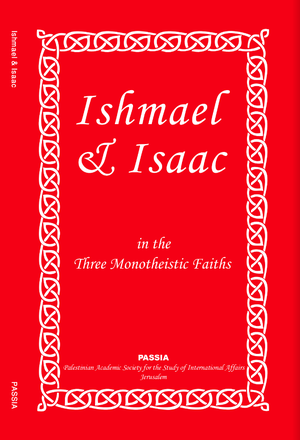Ishmael & Isaac in the Three Monotheistic Faiths
This publication is a compilation of three papers – one each by a Muslim, a Christian and a Jewish scholar - on Ishmael and Isaac, the sons of Abraham, the common patriarch of the three monotheistic religions. The papers were presented as part of the activities of PASSIA’s Religious Studies Unit. Authors include Dr. Yehezkel Landau (Jewish perspective), Father Rafiq Khoury (Christian perspective), and Dr. Mustafa Abu Sway (Muslim perspective).
Overview
For the past 10 years, the Religious Studies Unit at PASSIA has strived towards maintaining and advancing interfaith dialogue between the three monotheistic faiths: Judaism, Christianity and Islam. This sincere commitment is derived from our belief that contemporary societies continue to recognise the importance of religious dogma and its surrounding culture as a key component of community and the basic spirituality of mankind. As an organisation whose purpose revolves around a peaceful political solution to the Palestinian question, appreciating how all nations in the Middle East share an intimate link with religious phenomena allow us to conclude that this study is one that should be persevered; both for believers and non-believers alike.
What we hope to achieve from this series of monographs is to provide a literary avenue for eminent, regional theologians to evaluate the significance of religious figures from within their belief systems. This is done in order to give the reader a ‘direct line’ to opinion within religious communities, free from distortion and misinterpretation. In doing so, the reader can ascertain the overreaching similarities and differences of the author’s interpretations of the holy text and to deduce which one is personally gratifying to their own experience.
The story of Abraham and his two sons, Ishmael and Isaac (peace be upon them), serves as perhaps the best representation of the theological nexus between the ‘People of the Book’ (Ahl-al-Kitab) since Islam’s inception in the 7th Century AD. It is a story that becomes ever so more poignant in application to the present Palestinian/Israeli conflict that so frequently mirrors a “sibling rivalry”, a rivalry that has been a part of the monotheistic, scriptural narrative for centuries. This narrative (which often unfortunately emulates the shape of a ‘double helix’) has been instrumental in shaping both the socio-political context of the region and its current reality, as such, it is a story that should be scrutinised with distinct reverence and care. Traditions derived from the collective memory of different people serve as a constant reminder that inter-faith dialogue remains a crucial medium to extrapolate the religious imaginings of two peoples with the pragmatic formation of their political identity.
Contextually, Ishmael (Yishma'el in Hebrew and Ismail in Arabic), the first-born son of Abraham and his wife Sarah’s handmaiden, Hagar, is characterised in the Holy Qur’an as an important prophet of Islam and whose descendants (the Ishmaelites) are regarded by both the Jewish and Islamic traditions as the ancestors of the Arab people. Isaac (Yiṣḥāq in Hebrew and Ishaq in Arabic), on the other hand, holds the position in the Jewish faith as the second patriarch of the Jewish people, famous for his central role in the “Binding of Isaac” that bears testament to Abraham’s unwavering devotion towards Ha Shem/The Lord/Allah. Followers of the Christian faith maintain this perspective, consistent with the Biblical “Old Testament”.
The great gulf between theological traditions among Jews, Christians and Muslims revolves around who Abraham chose to be sacrificed. Whilst all three religions agree that Abraham’s unconditional devotion to God led to his willingness to sacrifice a son, Muslims dispute the Hebrew Bible’s account that said son was Isaac. Nevertheless, at the heart of this allegorical story there remains a parable that exemplifies the qualities of sacrifice, persistence and unconditional love that mankind, in faith, has the propensity to possess. In the current times of adversity that many involved in the Palestinian peace process lament, we must draw upon the experiences of Abraham, Ishmael and Isaac to unravel the shared ontological values that followers of the three distinctly share. For in order to comprehend the totality of the self, one must treasure the “face of the other”.
In concluding this introduction, we take deep solace in that the most illuminating contemporary study of the “Other” has been compiled by a Palestinian (Edward Said’s “Orientalism”), as such, we at PASSIA believe the perseverance of religio-political harmony remains the noblest of aims.

